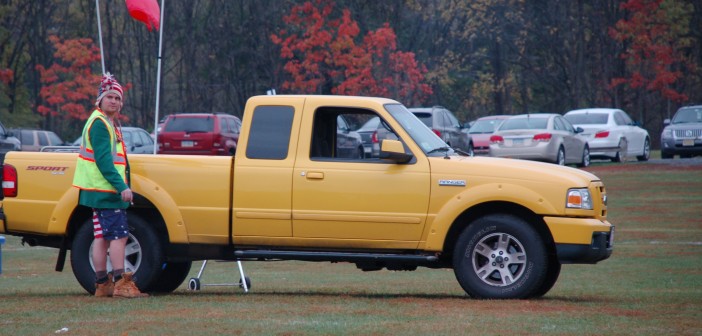If you’ve ever walked around Lehigh’s campus on a Saturday morning before a football game, you probably have encountered students wearing tutus, bunny ears, construction hats, mustard and ketchup costumes and many other out-of-the-ordinary outfits. Lehigh is unique in that, in recent years, students have created their very own spin on “morning cocktails,” better known as “mocos.”
“I like the tradition of mocos and dressing up crazy,” Stephi Kornfeld, ’15, said. “(It) is unique to Lehigh, and I don’t know of any other schools that partake in this tradition.”
The general consensus is that the tradition has both good and bad effects on Lehigh’s social life.
“In one sense, it’s a fun way for students to get together, dress up in crazy costumes and enjoy the fall football season,” Holly Meister, ’15, said. “However, it definitely has negative consequences, namely related to alcohol.”
Mocos, a wild, fun activity for students to dress up and start drinking early on Saturday morning, does not hold the same perspective for faculty and staff. Director of Gender Violence Education and Support Brooke DeSipio said mocos is “disrespectful and hurtful to athletes. People train so hard and do their best to bring school pride and spirit, and now the point is to get drunk.
“This affects drinking in a negative light,” she said. “In a healthy drinking atmosphere, you wear Lehigh gear, have a drink or two, eat a hot dog, and you go to the game.”
DeSipio discussed how the point is not to get as drunk as possible, but rather to come together as a community to support fellow athletes and the university as a whole.
Chief Ed Shupp of the Lehigh Police Department said that tailgates are “pretty lame; not many people (are) there nowadays. (They used to attract) hundreds of people, maybe even thousands but now we are lucky if we get 200.”
Similarly, Allison Ragon, Assistant Dean and Director of the First-Year Experience said, “it saddens me that there is no connection between mocos and the football game.” She emphasized how there is no support for the team, which sets a weird tone.
According to Barbara Turanchik, director of club sports and alumni from the first class of graduating women, this “tradition” started around 2008. It was a way for sorority women to differentiate themselves from others, Turanchik said. At the time, it was not men who dressed up in Halloween-like costumes, but rather just the women. But the morning cocktails we know today were not the morning cocktails that used to be around. People engaged in morning cocktails but still went to the football game. Today, we often see that this is no longer the case.
Lee Ramsden, ’13, said morning cocktails changed the atmosphere revolving around Lehigh spirit over the course of his four years at Lehigh. During his first year, Ramsden said his peers would go to football games, but by his senior year, most people just went to tailgates — and maybe went to the games depending on how the team was doing.
“People mostly just want an excuse to drink,” Ramsden said. “I started going to mocos my freshman year and went with people on my hall.”
Brendan Sullivan, ’14, ’15G, mentions how, over his four years here at Lehigh, people stopped going to football games altogether because the university cracked down on tailgates.
In previous years, morning cocktails happened after the games. Fraternity brothers and their chapters’ alumni would come together and had huge cocktail parties. This was a social event, and regardless of what fans wore to the game, everyone dressed up in formal attire for the post-game function. This was a way for fraternity brothers to connect with their alumni, and create a stronger bond.
“It was much more adult-like, and this was all part of the Lehigh pride,” Turanchik said.
Shupp said mocos today is not an event that takes place on campus, but rather off campus, and is therefore under the Bethlehem Police Department’s jurisdiction.
The big crowds in off-campus areas create safety issues, and disorderly house citations are often given. The police department has voiced concerns that it is unsafe to have so many people inside these off-campus houses. Assistant Chief of the Lehigh police Stuart Bedics also commented on how the influx of people walking around off-campus taxes the city’s resources.






Comment policy
Comments posted to The Brown and White website are reviewed by a moderator before being approved. Incendiary speech or harassing language, including comments targeted at individuals, may be deemed unacceptable and not published. Spam and other soliciting will also be declined.
The Brown and White also reserves the right to not publish entirely anonymous comments.
1 Comment
Pingback: A History of Greek Life at Lehigh University | Tim O'Hearn